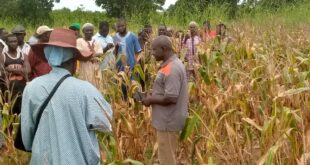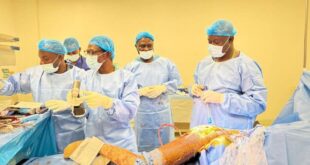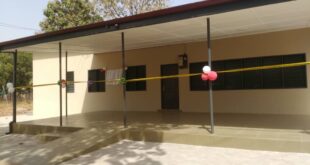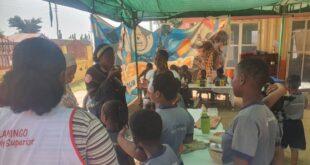
Tamale, Ghana – Representatives of the paramount chiefs of Buipe, Wungu and the Janga traditional areas in the Central Gonja and West Mamprusi Municipality of the Northern Region, have given assurances that women who need land for agricultural purposes would receive the necessary support in order to maximise the full benefit of any size allotted to them.
According to the chiefs, they appreciate the significant contributions women make to agriculture especially in food production and so therefore, giving land to women who need it for such purposes would help address the issues of food insecurity and poverty in their families.
The chiefs, however, indicated that, much as they are willing to support women to have adequate access to land with favourable terms and conditions, the women must also be willing to respect those terms and conditions binding the allotment of such lands.
These came to light when NORTHCODE-Ghana, a coalition of non-governmental organisations in Tamale held a workshop to disclose results of a survey conducted in the three aforementioned traditional areas for validation.

Neripewura Kipson Kurkur, a representative of His Royal Highness Jira Buipewura Mahama Abdulai Jinapor II of the Buipe Traditional Area, noted with concern how some people approach chiefs for lands but refuse to adhere to the terms and conditions they agreed to before the lands were given to them.
“When you agree to certain terms and conditions under a land lease agreement, you must respect such terms and conditions. Some will come and tell you that they need a land to farm crops but when you give them the land they decide to use it for a different purpose. They either plant trees or build on the land which is wrong.
“If you decide that you want a land to farm, farm on it when it is given to you. Dont use it for a different purpose. Dont also come to a chief for land and begin to speak or quote law. Once you start talking law or legalities, we will backtrack and keep our land”, Neripewura said.
So far, only the three paramountcies in the Central Gonja and West Mamprusi areas led by His Royal Highness, Naa Zoori of the Wungu Paramountcy, His Royal Highness, Soo Naa of the Janga Paramountcy and His Royal Highness, Jira Buipewura of Buipe Paramountcy have agreed to support the land bank project.

The survey, which was conducted under the NORTHCODE-USAID/ADVANCE Land Bank project being implemented in the Central Gonja and West Mamprusi areas, sought to identify pertinent issues linked to womens access to, ownership and control over agricultural lands.
It also sought to identify existing and potential local mechanisms for land redistributive equity as well as to ascertain knowledge about the land banks concept among community leaders and their willingness to adopt this model to address some of the challenges to womens land rights.
Respondents of the survey comprising of women farmers, chiefs, queen mothers, assembly members, religious leaders and land owners from six communities, were selected by virtue of their status as leaders, decision makers and duty bearers in the community.
Andrews Dokurugu, an independent consultant who conducted the survey, said “All respondents admitted without exception that males enjoy a greater degree of access to land than women”, adding, “he said Womens access to, ownership and control over farmlands is significantly limited when compared with males. This trend is driven and perpetuated by a number of factors: males are the ones that usually inherit lands through the patrilineal system of inheritance giving them an advantage over female members of the same family. Furthermore, males generally have additional social and economic clout for going out to formally negotiate for more lands. The net effect is that males are able to accumulate a greater proportion of farmlands from one generation to the next”.
He gathered that, “The opposition of most community men to womens ownership of farmland are well rehearsed and deeply entrenched”, noting that “they (men) are however more open to making concessions where it concerns access to and user rights only”.
Nonetheless, he pointed out that “Women have not been totally excluded from access to agricultural lands and local arrangements were noted in all the areas surveyed, for providing farmlands to women”.

Mr. Dokurugu also revealed that, “Although most respondents were not familiar with the land banks concept as a means to addressing womens needs in agricultural lands, they were nonetheless open to accepting the idea as a project strategy.
“Any efforts to achieve enduring solutions to womens poverty and social subordination must address the fundamental land tenure arrangements in these predominantly patriarchal societies. The existing systems of land tenure have not been seriously questioned and challenged from within because they were accepted as the cultural norm. But there is scope for negotiating improved access and secure user rights for women under existing tenure arrangements”, he stated.
In conclusion, he advised that what needs to engage the attention of NORTHCODE and USAID/ADVANCE is improvement in the security of land tenure.
“But women too must be systematically educated about all the different ways by which they can obtain secure access to farmland. The terms and conditions of any Memorandum of Understandings signed under the Womens Land Banks concept must place a premium on long term security of tenure over the land banks, Mr. Dokurugu urged.
Ernest Aayel, Policy Specialist of USAID/ADVANCE, a USA government programme in Ghana which is financing the project, said the survey work is very revealing and cited the fact that it highlighted some challenges brought out by a previous survey conducted in the beneficiary districts of the project.

According to him, the main objective of USAID/ADVANCE as donors is to see how women are able to utilise the lands that they have been able to access as a result of the implementation of the land bank project.
“Let me assure you that USAID/ADVANCE will continue to support women access to land for farming purposes”, Mr. Aayel emphasised.
Coalition for Development of Northern Ghana, NORTHCODE-Ghana is a membership based Coalition of NGOs, CBOs, CSOs with a common vision of complimenting Governments efforts of enhancing the lives of especially the poor and disadvantaged in Communities.
Some members include Centre for Women Opportunities (CENWOPP), Centre for Sustainable Livelihoods Programs,(CENSLIP), Drive for Health Foundation, Global Partnership for Rural Development (GLOPARD), Save Ghana Tumu, Jakpa Centre for Youth & Women Advocacy among others. NORTHCODE-Ghana envisions an empowered and enlightened society in Northern Ghana where equal opportunities exist for all, and which guarantees improved living standards for the poor and vulnerable whiles establishing for them, the mechanisms for the enjoyment of the blessings of human rights and freedoms.
Coordinator of NORTHCODE-Ghana, Cletus Zume, called for more lands to be allotted to women farmers to go into maize, soya beans, rice and especially cashew plantation since in his view; the tree plant is now overtaking cocoa in terms of monetary value.
By Savannahnewsonline.com/Philip Liebs
 Savannah News Online Reporting Only What Matters Most
Savannah News Online Reporting Only What Matters Most



